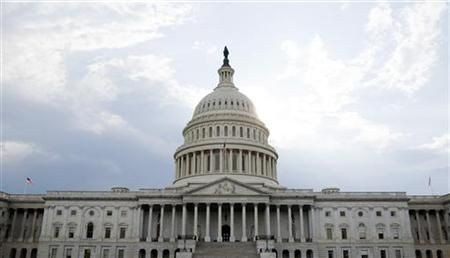Senate Republicans' Letter Warns Super Committee Against Tax Hikes

A letter circulated Thursday by U.S. Sen. Jim DeMint, R-S.C., to members of the budget deficit super committee warned against the use of increased tax revenues to meet the goal of closing at least a $1.2 trillion gap in the budget deficit over the next decade.
The letter was signed by 33 Republican senators, stipulating a bullet-point list for any legislation. The criteria included comprehensive tax reform that lowers rates and promotes economic growth, with no net tax increase.
Is Gap Building Between Six-Packs?
At a time when consensus on an overall deal seems miles away, the Senate Republicans' letter adds to ongoing speculation that sniping over tax increases has wedged a large gulf between the committee's six Democrats and six Republicans.
The letters' signees include three members of the bipartisan Gang of Six, with Senators Saxby Chambliss, R-Ga., Tom Coburn, R-Okla., and Michael Crapo, R-Idaho, signing the letter, despite devising a plan that would have increased tax revenue themselves.
The letter arrived on the heels of 100 House members, 40 Republicans and 60 Democrats, banding together to call for new revenue as party of any budget deficit plan. The effectiveness of a bipartisan mini-group of six formed within the super committee could also be derailed by the Senate Republicans' anti-tax stance.
The letter was a response to the super committee's Republicans floating a $2.2 trillion deficit reduction plan that included $600 billion in new tax revenue through changes to entitlements and tax reform.
Letter A Warning?
A Republican aide told The New York Times, The letter is a warning to Republican members of the super committee. The $600 billion tax hike floated last week is a nonstarter.
The super committee, formally known as the Joint Select Committee on Deficit Reduction, was established as part of a deficit reduction deal, the Budget Control Act, in exchange for raising the nation's debt ceiling on Aug. 2. While the U.S. government was allowed to borrow up to $2.4 trillion more through 2013, the super committee was charged with reaching a bipartisan consensus on $1.2 trillion in deficit reduction over the next decade, in addition to the roughly $900 billion in deficit reduction Congressional Republicans and President Barack Obama agreed to as part of the August debt deal.
Congress then has until Dec. 23 to pass the recommendations, otherwise trigger cuts, in the form of slashes to defense spending and Medicare benefits, would be automatically enacted.
© Copyright IBTimes 2024. All rights reserved.




















